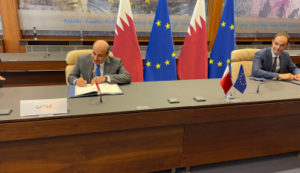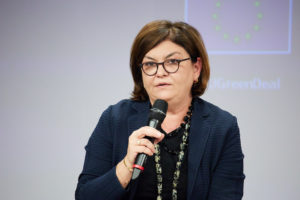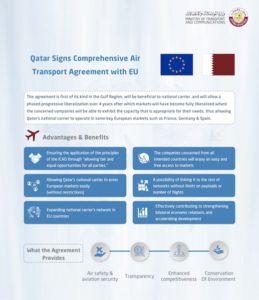

Overview
The goal of Europe’s Aviation Strategy* is to ensure the best possible connectivity for passengers and businesses, whilst maintaining high standards for safety, fair competition, the environment and social issues.
In 2016, the Commission received a mandate from the Council to negotiate a “Comprehensive Air Transport Agreement (CATA)” with the State of Qatar. The negotiations were concluded in 2019, but due to the dispute between Spain and the UK over the airport of Gibraltar, it was not possible for the EU to sign the agreement earlier. The agreement signed today will, for the first time, put in place a single set of rules for air transport services between the EU and Qatar. The agreement was signed in Luxembourg by Qatar’s Minister of Transport and Communications Jassim Saif Ahmed Al-Sulaiti, Minister of Foreign Affairs of the Republic of Slovenia Anže Logar, whose country is the current President of the Council of the EU, and the High Representative of the EU for Foreign Affairs and Security Policy and Vice-President of the European Commission Josep Borrell.

What are the benefits of the EU-Qatar aviation agreement?
Today all EU Member States, except one, have bilateral aviation agreements with Qatar. These agreements have already completely liberalised direct traffic between Qatar and all but five EU Member States, for which some restrictions are still in place. However, none of these agreements cover fair competition, financial transparency, the environment or social issues, which are critical for improving the sustainability of aviation and for ensuring a level playing field. The new agreement will replace all EU Member States’ bilateral aviation agreements with Qatar and provide a single, modern framework for air services between the EU and Qatar.
Going far beyond traffic rights, the EU-Qatar agreement will provide a single set of rules, a level playing field with strong provisions for fair competition, and a platform for future cooperation on a wide range of aviation issues (safety, security, air traffic management (ATM) etc.). In particular, it includes:
- a fair competition clause agreed with EU Member States and stakeholders to avoid distortions of competition and abuses;
- transparency provisions to ensure obligations are fully respected;
- provisions on social matters in line with those included in EU international trade agreements, committing the Parties to improve their social and labour policies in line with their international commitments and providing a forum to discuss social issues in aviation;
- a forum for regular meetings to address all issues and potential differences (joint committee meetings);
- mechanisms to swiftly resolve any dispute not resolved by the joint committee;
- provisions facilitating business, including removal of obligations for EU airlines to work through a local sponsor.
The agreement ensures that new traffic rights will gradually be made available, provides new business opportunities for European companies, and ensures fair and transparent market conditions, based on a clear regulatory framework. Global connectivity is a driver of trade and tourism, and contributes directly to economic growth and job creation.
I am an EU citizen – what is in it for me?
The EU-Qatar aviation agreement will improve connectivity and provide more options at competitive prices for passengers.
The agreement will ensure the highest standards for passenger safety and security. It spearheads a new generation of aviation agreements negotiated by the EU, which will all contribute to a more economically, socially and environmentally sustainable aviation sector.
What possibilities does the agreement offer in terms of market access?
Following the signature of the aviation agreement, both parties will immediately be able to exercise, so-called third and fourth freedom traffic rights between any airport in the EU and Qatar and vice versa. While these traffic rights are already unlimited for most Member States today, market opening will be gradual for Belgium, Germany, France, Italy and the Netherlands for both passenger and cargo flights.
This means that EU and Qatari airlines will be able to provide the following passenger services from the start of the IATA winter season 2021/22:
- Belgium: 24 weekly services between Qatar and Belgium.
- France: 27 weekly services between Qatar and Paris, 14 weekly services between Qatar and Nice, 14 weekly services between Qatar and Lyon, and 14 weekly services between Qatar and each of all other points in France.
- Germany: 21 weekly services between Qatar and Frankfurt, 21 weekly services between Qatar and Munich, and 14 weekly services between Qatar and each of all other points in Germany.
- Italy: 84 weekly services between Qatar and Italy.
- The Netherlands: 14 weekly services between Qatar and Amsterdam, and 14 weekly services between Qatar and each of all other points in The Netherlands.
The agreement does not provide any fifth freedom rights for passenger services to Qatari airlines, such as for example the option to fly from Doha to Brussels and from Brussels to the US.
For air cargo, the following rights will be granted to EU and Qatari airlines:
- Belgium: 42 weekly services between Qatar and Belgium.
- France: 14 weekly services between Qatar and France.
- Germany: 14 weekly services between Qatar and Germany.
- Italy: 21 weekly services between Qatar and Italy.
- The Netherlands: 14 weekly services between Qatar and The Netherlands.
In addition, EU and Qatari airlines will be entitled to operate limited fifth freedom traffic rights for all-cargo services between EU Member States and Qatar.
What kind of commercial opportunities will the agreement provide, in addition to traffic rights?
The agreement will help airlines operate through a series of business related provisions, such as on code sharing, pricing freedom, self-handling, intermodal transportation. It also removes the obligation for EU airlines to work through a local sponsor in Qatar.
Moreover, a joint committee established by the agreement to ensure overall monitoring of the application and functioning of its provisions is also entrusted to deal with any “doing business” issues.
Does the agreement contain provisions on environmental protection and social matters?
The parties have affirmed the need for urgent action to address climate change and the importance of high labour standards, and agreed to cooperate in these areas.
Will Qatar need to comply with future EU aviation legislation?
While the EU-Qatar aviation agreement provides for high regulatory standards, it does not require Qatar to transpose EU legislation.
Will the agreement guarantee fair competition between Qatari and EU airlines?
Guaranteeing fair competition in air transport markets is one of the EU’s key objectives when negotiating air transport agreements. There can be no open aviation markets without a level playing field.
The agreement contains strong safeguards in this respect, and provisions on fair competition. Strong enforcement mechanisms and obligations ensure financial transparency to avoid distortions of competition and abuses. Subsidisation and support for airlines is only possible in certain cases, and strict criteria apply. Detailed and agile dispute settlement procedures are also foreseen in case of disagreement between the parties.


















